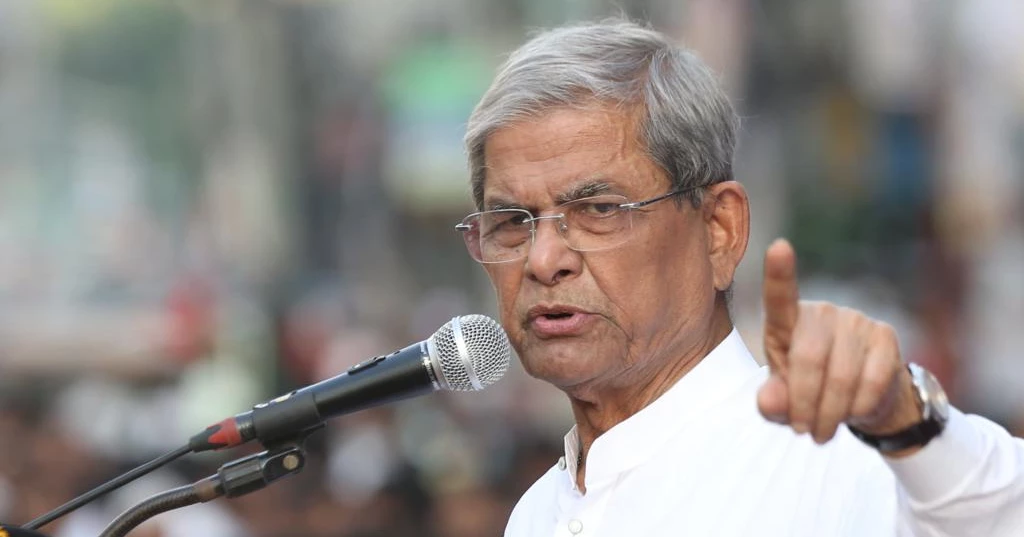BNP Secretary General Mirza Fakhrul Islam Alamgir on Friday urged the interim government to initiate an investigation under the United Nations into incidents of enforced disappearances that have plagued Bangladesh over the past 15 years.
Speaking at a solidarity meeting, he also called upon the government to take steps to provide allowances to each family of the victims of enforced disappearance.
"I have been in politics for a long time…I knew about arrests and killings, but we were not aware of enforced disappearances. Since the Awami League came to power, their law enforcement agencies have used state power to commit such heinous crimes against humanity,” the BNP leader said.
He appreciated that the current government, led by Prof Muhammad Yunus has signed the UN convention against enforced disappearances.
"It is also encouraging that, for the first time in Bangladesh, a team from the UN has arrived to take steps against the misdeeds committed by the (Sheikh Hasina’s) autocratic regime,” he said.
Fakhrul said this is an initial fact-finding UN team which will investigate the killings that have occurred over the past two months,
“I urge the government to engage with the UN Human Rights Commission to investigate all the crimes against humanity, killings, and enforced disappearances that have occurred over the past 15 years. If the interim government makes this request, the UN will certainly do it,” he said.
The BNP leader thanked the interim government for forming a five-member commission to find out forcibly disappeared people by the law enforcement agencies. “It’s a good step. But I also urge the government to ensure that allowances are provided to every family of the victims of enforced disappearance.”
Justifying his call for providing allowances, Fakhrul said many families are enduring significant hardship, struggling to support themselves, raise their children, and provide them with education. “It is the state’s duty to support these families. Even as we enjoy democracy, the children of those who have disappeared will never get their parents back, and those who have lost their husbands will never be reunited with them. Therefore, it is the responsibility of the state to take care of these families.”
Expressing solidarity with the pain and suffering of the families of the victims of enforced disappearances, the BNP leader said these families have long been sharing their distress. “When a child like Safa says, ‘I want to walk down the street holding my father’s hand and I want to go to Eid prayers with him,’ as a father, I cannot bear to witness such a pin.”
He said the state must restore the rights of the families of those who have been subjected to enforced disappearances and ensure justice for them. “We know the identities of those responsible for these disappearances. We need to find and hold accountable those who were in positions of authority, such as members of the RAB and special police units, and ensure they are punished.”
Fakhrul questioned why the dangerous individuals involved in enforced disappearances have not been arrested. “It pains us to see political leaders being detained, yet not a single person involved in murder, torture, or enforced disappearances has been arrested.”
He expressed hope that the perpetrators of the incidents of enforced disappearance will be arrested and punished soon. “We must work towards transforming Bangladesh into a genuinely accountable democratic state.”
In observance of the International Day of the Victims of Enforced Disappearances, a solidarity meeting was held in front of the BNP’s central office in Nayapaltan to remember the victims.
During the meeting, family members of those who have disappeared, from BNP and its affiliated organizations, expressed their deep anguish in moving terms, prompting thousands of leaders and activists to show their solidarity with tears.
Earlier in the morning, ‘Mayer Dak,’ a platform representing the families of the disappeared, organized a human chain at the Central Shaheed Minar. The event saw participation from human rights activists, politicians, lawyers, and relatives of the missing.
BNP Standing Committee member Salah Uddin Ahmed, who was in exile in India for 9 years after being subjected to enforced disappearance, said, "I want to say openly today that the main villains of the Ayna Ghor were Benazir (former IGP of police) and Ziaul Ahsan (former army officer).”
He mentioned that Zia was fired from the army and arrested, but he has not yet been interrogated. “At that time, he was a colonel; later he was promoted to Major General and retired, then arrested as part of a drama.”
The BNP leader said Ziaul Ahsan has not yet admitted his role in anyone’s disappearance, as those who worked to protect fascism, Hasina, and to prolong her power, are still in various positions of the state.
He said this interim government cannot achieve anything by keeping them in the picture.
He called for Zia to be interrogated thoroughly so that he is compelled to disclose all the disappearances, murders, and kidnappings that have occurred in Bangladesh under his leadership.
Salahuddin described Benzir as a supervillain and killer who played an immense role in sustaining Hasina`s misrule. “Where is he now? He must be found. He must be dragged from wherever he is in the world and handed over to us. He must be punished in Bangladesh.”
He demanded that notorious police officers like Harun or Rashid, Monirul Islam, and Chowdhury Abdullah Al Mamun be arrested and tried.
The BNP leader claimed that Sheikh Hasina established a reign of disappearances and murders. “Sheikh Hasina has fled to Delhi. I demand the Indian government send her back to Bangladesh. If she is not brought back, she will be tried in the international court.”
He also accused former army chief General Aziz Ahmed of being the mastermind behind many incidents of enforced disappearances and murders in Bangladesh, demanding his arrest.
Salahuddin recounted the horrific torture he endured during his confinement for 61 days after being subjected to enforced disappearance, before he was left alone near the Indian border.

















-20260221022942.jpg)
-20260221022827.webp)















